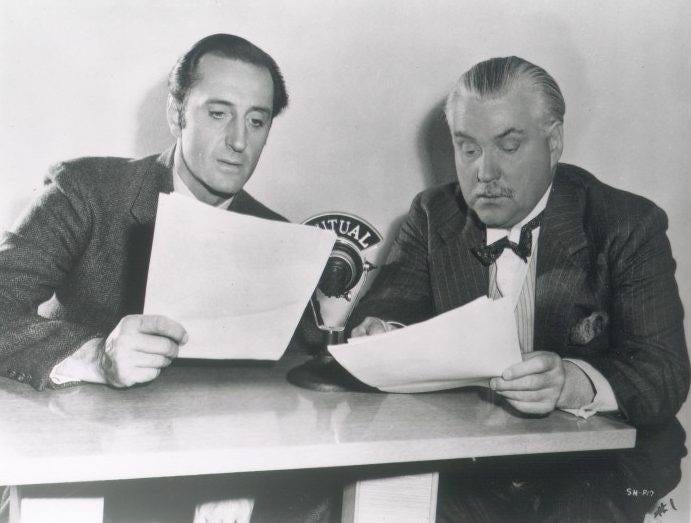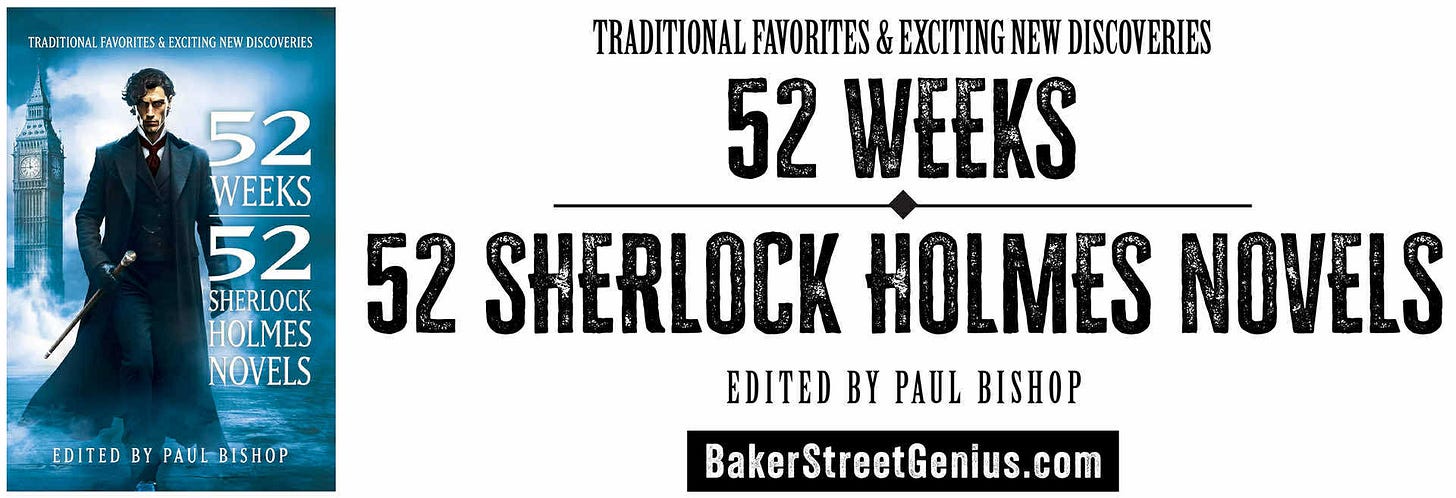The figure of Sherlock Holmes, born in the pages of The Strand Magazine in 1887, has proven uniquely suited to transcend the boundaries of print and adapt into almost every medium. While the deerstalker-clad detective is often associated with stage and screen, it is the voice of Holmes that has perhaps most consistently brought him into the private worlds of listeners around the globe. The radio—intimate, atmospheric, and unburdened by visuals—became a perfect vehicle for Holmesian drama. Across nearly a century, Holmes’s radio career has passed through numerous incarnations, each contributing to the mythos of the great detective, from early American broadcasts to rich BBC dramatizations, culminating in the modern reimaginings by Imagination Theater. The evolution of Holmes on the airwaves speaks to the amazing talents of the actors. Writers, and producers who brought the character to life in sound.
Radio’s first significant foray into the world of 221B Baker Street came with The Adventures of Sherlock Holmes, broadcast in the United States between 1930 and 1936. This series starred Richard Gordon as Holmes and Leigh Lovell as Dr. Watson, and was syndicated across multiple radio networks. Produced in an era when sound effects were still in their infancy and live broadcasts were the norm, these early episodes were necessarily theatrical, often relying heavily on the dialogue and the innate drama of Arthur Conan Doyle’s original stories.
Richard Gordon’s portrayal of Holmes was sharp and confident, aiming to capture the essence of the cerebral, aloof detective of the Canon. Leigh Lovell brought a warmth and grounding presence to Watson, avoiding the buffoonery that would later plague some interpretations. Though many recordings from this era are lost, the importance of these early adaptations cannot be overstated: they established the detective as a viable and popular subject for American radio and set the precedent for a Holmesian presence on the airwaves that would endure for decades.
Perhaps the most iconic and enduring American radio incarnation of Holmes came with The New Adventures of Sherlock Holmes, which ran from 1939 to 1950. Beginning as a tie-in to the highly successful Universal Pictures film series, this program starred Basil Rathbone as Holmes and Nigel Bruce as Watson. This pairing, already well-known to audiences from the silver screen, carried over to radio with enormous success. The transition was seamless, owing to the duo’s chemistry and familiarity with their roles.
Produced initially by Edith Meiser, one of the most influential figures in Holmesian adaptation, the series combined dramatizations of classic Doyle stories with original pastiches. Meiser was responsible for crafting a great deal of the new material, blending authenticity with fresh plots. Bruce’s Watson was characterized by joviality and loyal befuddlement, while Rathbone’s Holmes was authoritative and brisk—a continuation of his cinematic portrayal.
After Rathbone left the series in 1946, Tom Conway briefly stepped into the role of Holmes, with Bruce staying on as Watson. Despite Conway’s capable performance, the magic of the original pairing proved difficult to replicate, and the show’s popularity began to wane. Nevertheless, with over 200 episodes and a widespread audience, The New Adventures of Sherlock Holmes was a cornerstone of American old-time radio and played a pivotal role in popularizing the detective in the mid-20th century.
Across the Atlantic, the BBC developed its own long-running Holmes series beginning in 1952, with Carleton Hobbs as Holmes and Norman Shelley as Watson. This pairing would define the British radio Holmes for nearly two decades. Unlike their American counterparts, Hobbs and Shelley hewed closer to the spirit of Conan Doyle’s stories, with an emphasis on authenticity, literary fidelity, and period accuracy.
Under the BBC’s meticulous production values and often directed by Graham Gauld or Martyn C. Webster, these broadcasts were rich in atmosphere, utilizing subtle sound design and carefully written scripts that often lifted dialogue directly from Doyle’s prose. Hobbs’ Holmes was scholarly, intense, and often imperious—traits that reflected the Victorian origins of the character. Shelley’s Watson was more nuanced than Bruce’s, presenting a capable assistant rather than a comic foil.
Spanning adaptations of nearly all sixty Canonical stories, the BBC series starring Hobbs and Shelley remains one of the most comprehensive and faithful radio renderings of Holmes to date. For many British listeners in the postwar era, this was the definitive Holmes—a dignified, cerebral figure brought vividly to life through the medium of sound.
In the mid-1950s, a short but illustrious series of Holmes broadcasts brought together two of Britain’s most revered theatrical actors: Sir John Gielgud as Holmes and Sir Ralph Richardson as Watson. Produced by the BBC in conjunction with the American Broadcasting Company and directed by Peter Cotes, these twelve episodes featured adaptations of classic stories such as The Red-Headed League and The Bruce-Partington Plans.
Gielgud’s Holmes was aristocratic, cool, and precise—a performance infused with Shakespearian gravitas. Richardson’s Watson was tender and sympathetic, displaying emotional intelligence that was often overlooked in other portrayals. The production values were high, and the casts included stars such as Orson Welles, who played Professor Moriarty in The Final Problem.
Though the series was short-lived, it was a tour de force of radio drama. It combined the dramatic flair of stage actors with the intimacy of radio and elevated Holmes on the airwaves to a level of high art. These broadcasts are still widely regarded as among the finest Holmes productions in any medium.
The tradition of Holmes on radio has continued into the 21st century, most notably with The Further Adventures of Sherlock Holmes, created, written, and produced by Jim French for Seattle-based Imagination Theater. First broadcast in 1998, these stories are original pastiches based on minor references or allusions in the Canon. The series stars John Patrick Lowrie as Holmes and Lawrence Albert as Watson, bringing new life to the characters for a modern audience.
Jim French’s scripts are notable for their intelligence, creativity, and fidelity to the spirit of Doyle’s writing. The stories explore Holmes’ world with fresh plots while maintaining Canonical consistency. The sound design is sophisticated, and the performances are grounded and engaging. Lowrie’s Holmes is incisive, dryly witty, and emotionally complex, while Albert’s Watson strikes a fine balance between warmth and competence.
Over two decades later, The Further Adventures of Sherlock Holmes has grown into one of the longest-running Holmes radio series in history, with hundreds of episodes to its name. It has proven that the detective still has a vibrant place in contemporary audio storytelling. The series has been praised for reviving the traditions of radio drama in an age dominated by visual media, and for deepening the mythology of Sherlock Holmes in meaningful ways.
The story of Sherlock Holmes on radio is one of adaptation, reinvention, and enduring fascination. From the crackling broadcasts of the 1930s to the modern polish of Jim French’s productions, each era has shaped Holmes in its own image. Whether through the commanding tones of Basil Rathbone, the theatrical elegance of Gielgud, the stoic intelligence of Hobbs, or the thoughtful voice of Lowrie, Holmes has remained a figure uniquely suited to sound.
Radio allows for a Holmes unencumbered by visuals, where imagination fills in the fog of Baker Street and the quiet menace of a villain’s whisper. In many ways, Holmes has never sounded better—or more alive—than through the speakers of a radio. The legacy of Sherlock Holmes in audio drama is not only a tribute to Conan Doyle’s creation but also a testament to the power of voice to conjure mystery, intellect, and timeless adventure.
Paul Bishop is the author of fifteen novels, including the award winning Lie Catchers. He is also the editor of 52 Weeks 52 Sherlock Holmes Novels—a multi-author compendium of essays regarding fifty-two of the best Sherlockian pastiches plus much more—Available on Amazon or from Genius Books...




Orson Welles played Holmes on radio as well as Moriarty. His "Mercury Theater on the Air" adapted the William Gillette play on September 25, 1938--about a month before the more famous War of the Worlds broadcast.